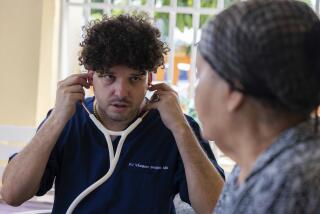Doctors Learn to Blend Folk, Modern Medicine
- Share via
The doctor gave the little Latino girl a standard medical examination, wrote a prescription for an antibiotic, then gently touched the child’s forehead to prevent mal de ojo, or evil eye.
The doctor had combined modern medical care with a knowledge and respect for Latino tradition and folk medicine.
He knew how to break the “unnatural bond” that the 5-year-old child and her family fear can develop during even a few minutes spent with an admiring stranger.
The child’s mother left the Community Clinic of Orange County smiling, knowing her daughter would be safe from mal de ojo.
Blend of Old, New
The Santa Ana-based clinic is primary home to UC Irvine’s department of family medicine residency program, where anthropologists train doctors to understand and incorporate traditional medicine into modern treatments.
Medical anthropologist Dr. Arthur Rubel teaches the residents about folk diseases among the Latino and Southeast Asian communities.
Rubel was recruited after a UC Irvine study revealed that most of the clinic’s doctors were unfamiliar with folk diseases, although 80% of the clinic’s 30,000 annual visits are by Spanish-speaking people.
“Very often in pediatric cases, the physician tries to build rapport with the mother and child,” he said. “They admire the child, comment on her pretty dress and so forth.
“If the child develops diarrhea or sleeplessness that night or even several days later, the parents have to find a cause and consider whether someone outside the family has cast admiring glances or made admiring comments about the child. And they’ll blame the physician.”
Genuine Concerns
As a consequence, the family will be even more hesitant to bring the child back to the clinic, not willing to risk another exposure to evil eye, he said.
Words like mal de ojo, susto or empacho mean little to most Anglos, but represent very real medical conditions among the Latino community.
Yet they are conditions as prevalent among Spanish-speaking people as the common cold. And all too many physicians still have no idea what they mean, Rubel said.
“These people aren’t stupid or illogical,” Rubel said. “They’re working with the resources they have, which include their understanding of the body and its mechanisms.”
Rather than discouraging parents to use traditional cures, doctors are taught to suggest that modern treatments be used first or in conjunction with folk remedies.
‘Active Participants’
“It permits parents to be active participants in the care of their own children,” Rubel said.
Pediatrician Quynh Kieu, a UCI med school graduate who lectures about health care beliefs of Southeast Asians, said many Southeast Asians are reluctant to mix Eastern and Western medicine.
“They might tell you, ‘I can’t take that now because I’m taking an herbal tonic,”’ she said.
“I ask them to stop the tonic temporarily while they’re taking my medication and then take their tonic again after they’re better. If you do that, they are a lot more prone to listen because they feel you are considerate of their needs and wants.”
UCI family medicine faculty member Dr. Dennis Mull and his wife, Dorothy, a post-doctoral research fellow, have spent years investigating the social aspects of medical care.
Breaking Down Barriers
For the past six summers, they have lived among the Tarahumara Indians of Chihuaha, Mexico, studying their medical practices. They also work on projects to break down the barriers to health care for the indigent Mexican workers in Orange County.
Doctors who discount the importance of traditional beliefs often find their own advice ignored, Dennis Mull said.
“Frequently, the patients will be very respectful and nod and say ‘yes’ and turn around and do nothing we advised because they thought it was all crazy, that we just missed the boat because we didn’t take into account empacho or some other disease,” he said.
“They walk out the door and we never see them again.”
More to Read
Sign up for Essential California
The most important California stories and recommendations in your inbox every morning.
You may occasionally receive promotional content from the Los Angeles Times.










